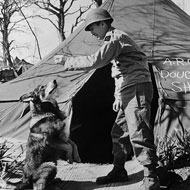
Chips saved his platoon when they came under fierce attack
A US army dog has posthumously received the animal equivalent of the Victoria Cross, for showing extraordinary courage in saving the lives of his platoon during the 1943 invasion of Sicily.
Chips, a German shepherd-husky cross, was described as a “real war hero” by PDSA’s director general Jan McLoughlin. A Dickin Medal for the army dog was presented today (15 January) at the Churchill War Rooms in London, on the 75th anniversary of the Casablanca Conference.
Chips served as sentry at the 1943 conference, where Winston Churchill and US president Franklin D Roosevelt met to map the Allied Forces’ strategy for the next phase of war.
US army attaché Lieutenant Colonel Alan Throop and military working dog Ayron, accepted the medal on Chips’ behalf.
Lieutenant Colonel Throop commented: “The soldiers that served during WWII faced untold hardships and the dogs that served alongside them truly helped them defeat the enemy. Chips’ story demonstrates the vital role that these animals played, and continue to play today. I am proud to play a small part in recognising his actions.”
Operation Husky
Chips received the Dickin Medal for his part in ‘Operation Husky’ on 10 July 1943 - one of the largest combined operations to take place during the war. As he was led ashore under cover of darkness, the platoon was attacked by an enemy machine gun team which were hidden in a nearby hut.
While the soldiers ran for cover, Chips broke free and rushed at the hut ‘with ferocious intent’ - despite a barrage of gunfire. His handler, Private Rowell, said: “There was an awful lot of noise and the firing stopped. Then I saw one soldier come out of the door with Chips at his throat. I called him off before he could kill the man.”
Three other enemy soldiers followed with their hands above their heads. It transpired that Chips had seized the machine gun by the barrel and pulled it off its mount. His actions undoubtedly saved the lives of his platoon.
After the war
Chips was honourably discharged after the war and the men in his platoon unofficially gave him a Theatre Ribbon with Arrowhead, together with eight battle stars - one for each of his campaigns. Chips went home to New York, where he resumed life as a family pet with the Wren family.
John Wren was only four years old when his father donated Chips to the war effort. Now aged 76, he travelled to London with his wife Sharon to attend the awards ceremony.
Mr Wren commented: “Chips was something of a celebrity when he returned from the war but we were just pleased to have our dog back. The letters that my father received from the soldiers that Chips served with prove just what a valuable asset he was to the US Army and I am so thrilled to see his service recognised here today.”
Chips is the 70th recipient of the PDSA Dickin Medal and only one of two US Army animals to receive it. His medal will be loaned to the National World War II Museum in New Orleans.
Image © F&F



 The RCVS has announced a new version of its 1CPD mobile app, with enhanced features for veterinary surgeons and veterinary nurses to record their continuing professional development.
The RCVS has announced a new version of its 1CPD mobile app, with enhanced features for veterinary surgeons and veterinary nurses to record their continuing professional development.